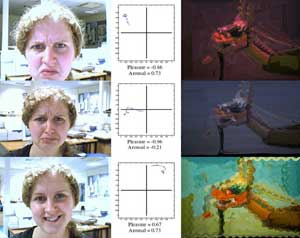Scientists develop artwork that changes to suit your mood

Using images collected through a web cam, special software recognises eight key facial features that characterise the emotional state of the person viewing the artwork.
It then adapts the colours and brush strokes of the digital artwork to suit the changing mood of the viewer.
For example, when the viewer is angry the colours are dark and appear to have been applied to the canvas with more violent brush strokes.
If their expression changes to happy, the artwork adapts so that the colours are vibrant and more subtly applied.
The project forms part of on-going research looking to develop a range of advanced artwork tools for use in the computer graphics industry.
This has already resulted in software which produces highly-detailed artistic versions of photographs, and allows designers to create animations directly from digital footage.
“The programme analyses the image for eight facial expressions, such as the position and shape of the mouth, the openness of the eyes, and the angle of the brows, to work out the emotional state of the viewer,” said Dr John Collomosse from the Department of Computer Science at the University of Bath.
“It does all of this in real time, meaning that as the viewer’s emotions change the artwork responds accordingly.
“This results in a digital canvas that smoothly varies its colours and style, and provides a novel interactive artistic experience.
“This kind of empathic painting only needs a desk top computer and a webcam to work, so once you have the programme and have calibrated it for the individual viewer, you are ready to start creating personalised art based on your mood.
“The empathic painting is really an experiment into the feasibility of using high level control parameters, such as emotional state, to replace the many low-level tools that users currently have at their disposal to affect the output of artistic rendering.”
The empathic painting project was carried out with Maria Shugrina and Margrit Betke from the University of Boston.
The images used in the project were created by the researchers using advanced artistic rendering techniques which give the computer-generated artwork the appearance of having been painted onto canvas.
More information on the empathic painting project, including a video demonstration, is available on the project website (see related links section).
The research was recently presented at the fourth International Symposium on Non-Photorealistic Animation and Rendering (NPAR) conference in Annecy as part of the International Animation Festival.
The University of Bath is one of the UK's leading universities, with an international reputation for quality research and teaching. In 16 subject areas the University of Bath is rated in the top ten in the country. View a full list of the University's press releases: http://www.bath.ac.uk/news/releases
Media Contact
More Information:
http://www.bath.ac.ukAll latest news from the category: Information Technology
Here you can find a summary of innovations in the fields of information and data processing and up-to-date developments on IT equipment and hardware.
This area covers topics such as IT services, IT architectures, IT management and telecommunications.
Newest articles

Humans vs Machines—Who’s Better at Recognizing Speech?
Are humans or machines better at recognizing speech? A new study shows that in noisy conditions, current automatic speech recognition (ASR) systems achieve remarkable accuracy and sometimes even surpass human…

Not Lost in Translation: AI Increases Sign Language Recognition Accuracy
Additional data can help differentiate subtle gestures, hand positions, facial expressions The Complexity of Sign Languages Sign languages have been developed by nations around the world to fit the local…

Breaking the Ice: Glacier Melting Alters Arctic Fjord Ecosystems
The regions of the Arctic are particularly vulnerable to climate change. However, there is a lack of comprehensive scientific information about the environmental changes there. Researchers from the Helmholtz Center…



